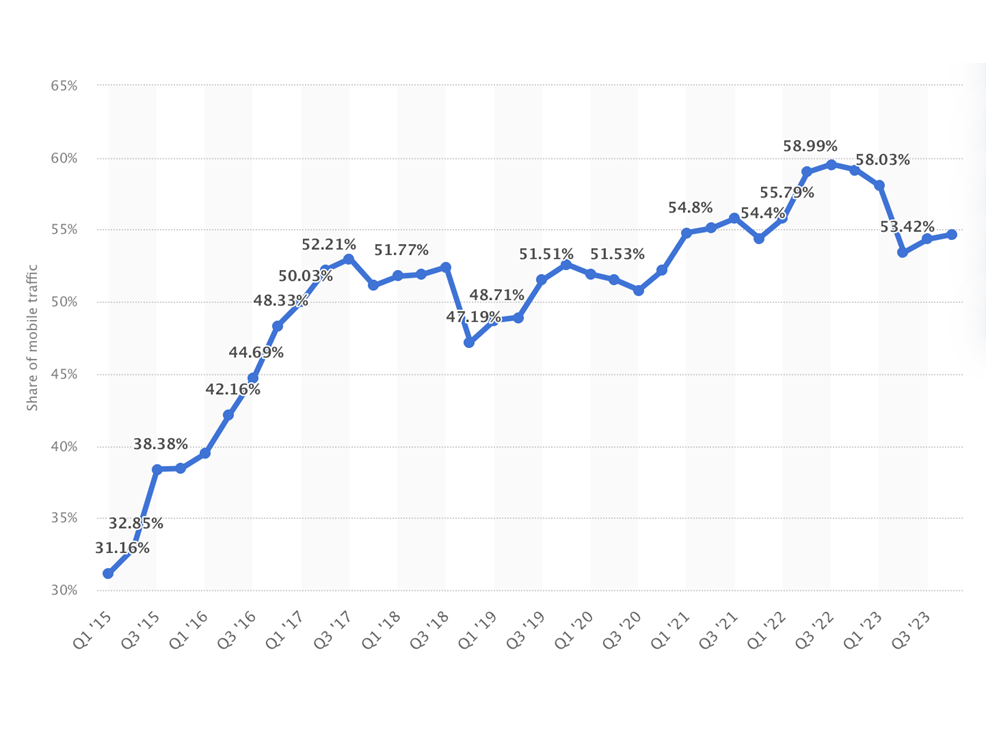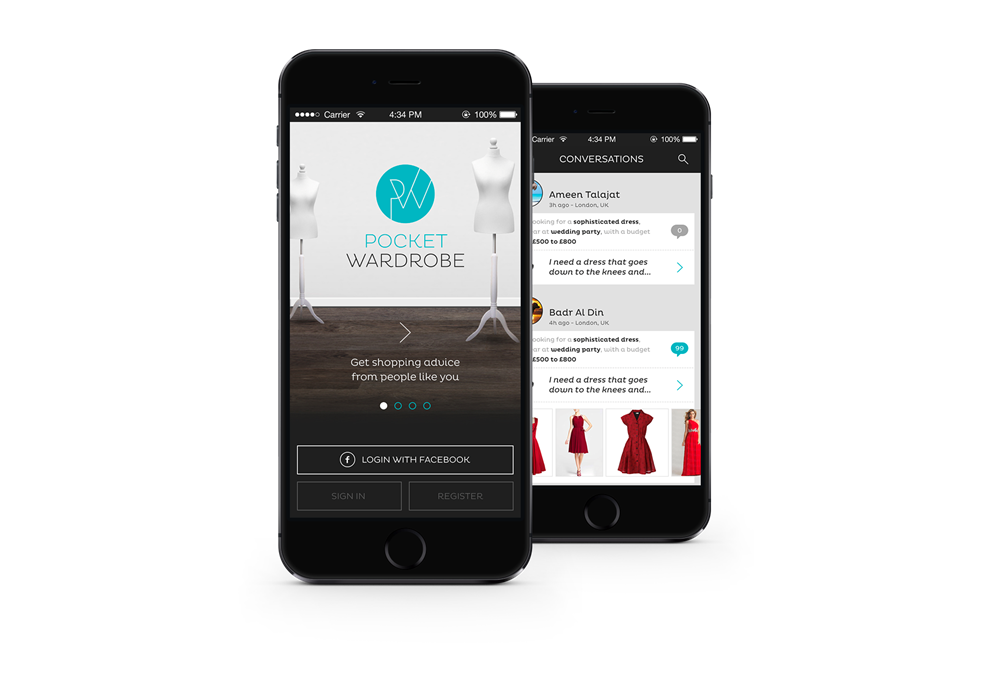Top Statistics & Facts to Consider in Year 2024 when Designing a Website
Another year is upon us, and as we wish Happy New Year to all of our clients and followers here at Appnova, it gives us the perfect chance to look ahead and discuss what’s happening in the web design industry at the moment.
What are the latest web design statistics?
Just how important is the design of your website in 2024?
What trends should you be on the lookout for?
These are some of the questions I’ll be addressing, as we look ahead to what’s sure to be another exciting year in our ever-changing industry.
Why web design matters?
Our web designers have been working passionately on creating stunning sites for our clients since we were launched back in 2005. But I can honestly say, their skills have never been more important than they are now.
Did you know…?
- Good UI designs can boost your conversion rate by as much as 200%
- 94% of first impressions are based on the design of a website
- 75% of users trust a website based on the design
These web design statistics alone show just how significant web design is!
Impact of web design in 2024
The growing importance of it is all about evolving consumer behaviours and expectations. Today, they don’t just want information; they want a seamless, engaging, and personalised experience when interacting with a brand website. Website design plays a crucial role in achieving a higher user engagement rate and conversion.
As we delve deeper, we’ll look at pivotal website design statistics and some of the main factors influencing web design in 2024.
Significance of user experience in web design
User experience (UX) stands at the forefront of web design; it determines the success or failure of a website. It encapsulates the journey and interactions users have with a site, emphasising the critical role of intuitive navigation, engaging content, and seamless usability in crafting digital experiences that resonate and retain.
Some of the benefits of a good UX include:
- Significantly boost conversion rates, turning visitors into customers or subscribers
- Enhances your brand’s credibility and reputation
- Enjoy higher customer satisfaction
- Keep visitors engaged and reduce bounce rates
- Search engines like Google reward user-friendly websites with better rankings
- A superior UX sets you apart from competitors and can become a unique selling point
Let’s take a look at some of the vital elements of web design user experience in 2024:
Website speed performance
Attention spans are shorter than ever! Consumers have little tolerance for slow-loading websites.
Web design stats show that fast, responsive web design is crucial for keeping users engaged and reducing bounce rates.
An eCommerce site that loads within one second will convert 2.5x more visitors than one that loads in 5 seconds!
And, let’s just go back to mobile web design statistics for a second (it all ties together!). Are you surprised to learn that web pages load 70.9% slower on mobile devices than on desktops? Wow, that’s a big speed reduction!
It’s a big problem as well, especially when you consider that 48% of people in the UK expect mobile websites to load within three seconds. Just another reason why mobile optimisation is now crucial, not optional.
The mobile-first approach
I’m sure you won’t be surprised to learn that 98% of all 16 to 24-year-olds in the UK have a smartphone. Even amongst the older age groups, i.e. 55 to 64-years-olds, 86% own smartphones.
Furthermore, mobile devices make up roughly half of the world’s web traffic. In the first quarter of 2023, excluding tablets, they accounted for 58.33 per cent of global website traffic.

Graph shows global mobile traffic in 2023 | Source: Statista
What this means is that a mobile-first approach in web design is no longer optional.
Consumers expect websites to load quickly, display correctly, and offer easy navigation on their mobile devices. In fact, if your website is mobile-optimised, 74% of users will return!
If your website looks clunky and doesn’t load properly on a mobile device, you really need to take action. Take a look at our collaboration with Pocket Wardrobe. We gave smart, busy style-hunters fast, digital shopping services directly in their pockets.

Is your website mobile-optimised? Contact Appnova today to make sure mobile users enjoy a seamless experience!
Additional elements to consider
Not only do you need to factor in website performance and mobile optimisation, but elements like accessibility and privacy are also key.
Accessibility and inclusivity
One of the reasons why you may need to engage the services of a creative design agency in 2024 is to make sure your website is inclusive and accessible to everyone.
Ensuring that websites are navigable and understandable by people of all abilities is not only a moral imperative but also expands your potential audience.
To give you a bit more of an understanding, here are some of the changes you may need to make:
- Ensure your site can be navigated using only a keyboard
- Use fonts that are easy to read and ensure text size can be increased without breaking the layout
- Make sure there’s sufficient contrast between text and background colours
- Provide captions for videos and transcripts for audio content
- Use ARIA (Accessible Rich Internet Applications) landmarks and roles to enhance the accessibility of complex web content and dynamic applications for screen reader users
If you would like to discuss the accessibility and inclusivity of your website, please do not hesitate to get in touch with the team at Appnova today at +44 20 7384 3324. We’d be more than happy to help. After all, the digital world is for everyone.
Visual aesthetics and branding
Of course, websites have always needed to look good! But consumer standards have certainly gotten higher over the years.
Cast your mind back to those awful websites that looked like they were created on Microsoft Paint. Wow!
Imagine if you landed on a site like that today, what would you think? Your guard would immediately go up, right? A well-designed website helps establish brand credibility and trust.
Security and privacy
I simply cannot give you web design statistics without throwing in this shocking fact:
Around 30,000 websites are hacked every single day!
That’s a lot of websites. This means you simply cannot afford to have a blasé attitude when it comes to cyber security. It’s YOUR responsibility to make sure that your customers’ data is secure.
You also need to be transparent about the data you collect and how you use it.
Trustworthy web design includes robust security features and clear privacy policies.
Benefits of optimised web designs
If you optimise your website effectively, you can expect a whole host of benefits. Here’s a snapshot:
Enhanced user experience
Optimised designs prioritise user experience, making websites easy to navigate, visually appealing, and responsive. This leads to increased user satisfaction and engagement, encouraging visitors to stay longer and explore more.
Improved conversion rates
By creating a user-friendly environment, optimised web designs help in converting more visitors into customers. Features like clear call-to-action buttons, simplified forms, and intuitive layouts reduce friction in the user journey, leading to higher conversion rates.
Better search engine rankings
Search engines favour websites that provide a good user experience, including mobile-friendliness, fast loading times, and engaging content. An optimised web design adheres to these criteria, improving a website’s visibility and organic search rankings.
A great experience across all devices
With the increasing use of smartphones for internet browsing, mobile optimisation is critical. Optimised web designs ensure that websites look great and function well on all devices, providing a seamless experience for mobile users.
Lower bounce rates
An engaging and user-friendly design keeps visitors interested, reducing the likelihood of them leaving the site quickly (bounce). This not only improves the site’s performance metrics but also increases the chances of conversion.
Enhanced trust
A well-designed website reflects professionalism and credibility, strengthening the brand’s image. It creates a positive first impression, builds trust, and distinguishes the brand from competitors.
Stay relevant at all times
Keeping up with the latest design trends and technologies, such as AI, AR/VR, and voice interfaces, makes a website more adaptable to future developments. This forward-thinking approach ensures the website remains relevant and competitive.
What lies ahead in the world of web design?
Now that we’ve really gotten into the nitty-gritty of why web design is more important now than it ever has been, let’s focus on web design trends and what we can expect in the future.
- Artificial Intelligence (AI) and Machine Learning (ML) – AI and ML will continue to play an increasingly significant role in web design. AI-driven chatbots and virtual assistants will become more sophisticated, providing real-time assistance and enhancing user engagement.
- Voice User Interface (VUI) – With the rising popularity of voice-activated devices, web design will increasingly incorporate voice user interfaces. This will involve optimising websites for voice search and designing voice-interactive elements to improve accessibility and user experience.
- Augmented Reality (AR) and Virtual Reality (VR) – AR and VR technologies will become more integrated into web design, offering immersive experiences that engage users in new and exciting ways. This could include virtual product try-ons, interactive 3D models, and virtual tours.
- Minimalism and simplified user interfaces – The trend towards minimalism in web design is likely to continue, with a focus on clean, uncluttered layouts that emphasise content and improve usability. Simplified navigation and intuitive user interfaces will be key in keeping users engaged.
- Advanced animation and interactive elements – As browser technologies evolve, we can expect to see more advanced animations and interactive elements in web design. These features can enhance storytelling, guide user attention, and make the overall experience more dynamic and engaging.
- Sustainability in web design – With growing awareness of environmental issues, sustainable web design will gain traction. This involves creating websites that are energy-efficient, have minimal carbon footprints, and prioritise eco-friendly practices.
- Responsive beyond mobile – As new devices and screen sizes emerge, responsive design will evolve beyond mobile, ensuring seamless experiences across all types of devices, including wearables and large displays.
The online world never sits still
In 2024, web design is more critical than ever due to evolving consumer behaviours and expectations for seamless, engaging, and personalised online experiences. Here are some key takeaways to keep in mind:
- With the widespread use of smartphones, designing websites with a mobile-first perspective is essential for user satisfaction and engagement.
- Consumers expect personalised content and recommendations, emphasising the need for tailored web experiences.
- Fast-loading websites are vital for retaining users and improving conversion rates, especially in a time of decreasing attention spans.
- Making websites accessible to all users is both a moral imperative and a means to broaden your audience, requiring specific design adjustments.
- High-quality visual design is necessary for establishing brand credibility and trust among users.
- With the increasing threat of cyber-attacks, ensuring website security and transparent privacy policies is indispensable.
I hope that you’ve enjoyed this blog on the current state of web design and what the year has in store for us. One thing we can all agree on; the digital landscape is always changing and evolving. That’s why it’s so important to have a digital partner that lives and breathes all things online. Drop us an email at [email protected] if you have any questions or if you’d like to discuss how to take your online presence to new heights in 2024. We’d love to hear from you.
Subscribe To Us
Contributors
Categories
Subscribe To Us
Contributors
Categories

This website uses cookies so that we can provide you with the best user experience possible. Cookie information is stored in your browser and performs functions such as recognising you when you return to our website and helping our team to understand which sections of the website you find most interesting and useful. Third party cookies such as Google Analytics is also used on this site to provide analytics in order to better understand the user engagement on our site.
You can adjust all of your cookie settings by navigating the tabs on the left hand side.
Strictly Necessary Cookie should be enabled at all times so that we can save your preferences for cookie settings.
If you disable this cookie, we will not be able to save your preferences. This means that every time you visit this website you will need to enable or disable cookies again.







0.Comments